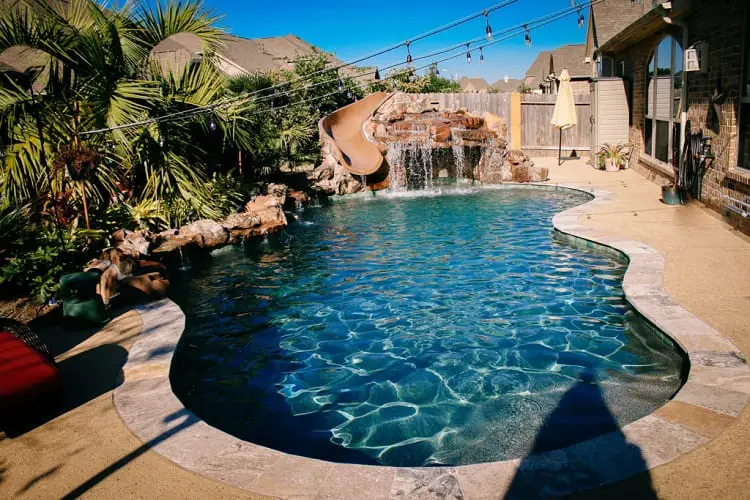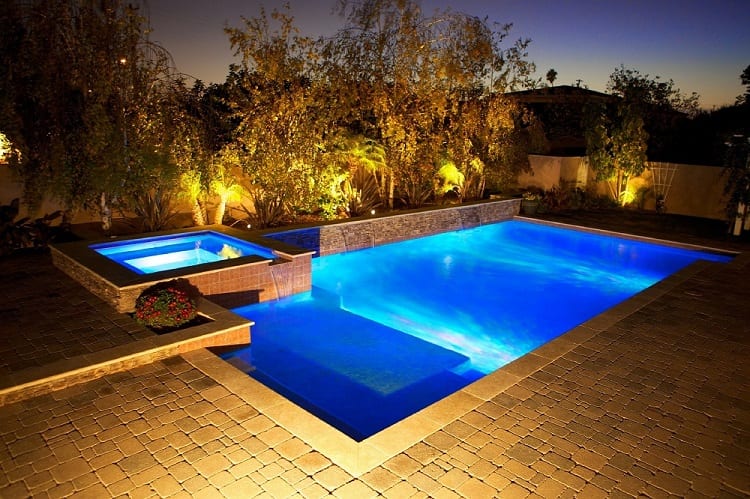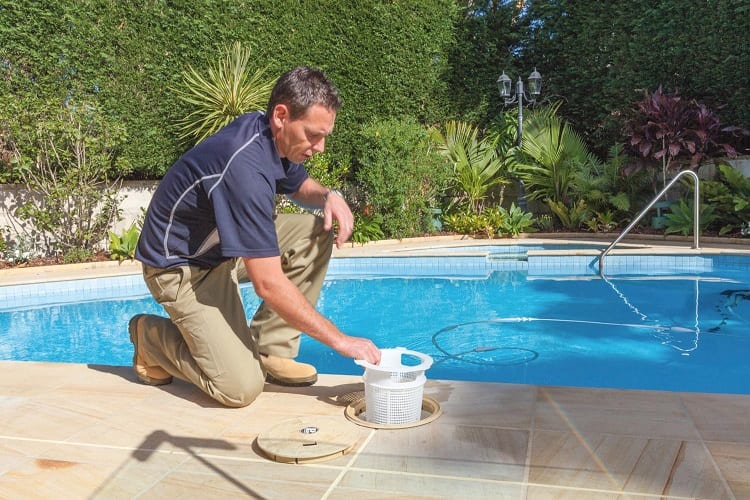If you are considering building a new saltwater pool system or converting your traditional chlorine pool to a saltwater pool, you would probably have many questions and confusion.
Here are some of the questions that you might have about the saltwater pool system and the answers.
Contents
Saltwater Pools – Overview

It is quite common to assume that saltwater pools are the same as oceans. In other words, people assume that the swimming experience in a saltwater pool (including the salty water taste from the ocean) is the same as that of the ocean.
But in the world of pools, that is not the case. Saltwater pool system gets its name not because the water is very salty but because salt is added in the water for pool sanitation.
Moreover, the salt concentration in a saltwater pool system is pretty low compared to the amount of salt in oceans. If you look at the specific concentration, a saltwater pool contains around 3,000 ppm of salt.
And with this concentration, it is almost impossible for swimmers to be aware of salt’s presence in the pool. All the salt added to the pool is used to generate a chemical reaction that creates chlorine for maintaining a clean pool.
The saltwater pool system contains a generator where salt is added and then converted into chlorine through electrolysis.
How the saltwater pool system generator works to create chlorine is covered in the later sections. Here it is important to remember that unlike a traditional chlorine pool where you have to add chlorine tablets, a saltwater pool system generates its own chlorine using salt.
What are the Benefits of a Saltwater Pool?

Now that you have the basic information about saltwater pools, let’s look at six known saltwater pools’ benefits.
Saltwater Pools are Gentle on Skin
Compared to traditional chlorine pools, saltwater pools are gentle on the skin. If you have ever swum in a chlorine pool, you would know that water in a chlorine pool can irritate the eyes and can cause itchy skin.
Moreover, the chemical can also lead to wear and tear of your swimming gear.In contrast, water in the saltwater pools ismore gentle on the eyes, skin and even on clothing.
Saltwater Pools Do Not Have the Harsh Chlorine Smell
Saltwater pools do not have the typical smell of chlorine. When chlorine tablets are added to a swimming pool for sanitation, it often comes with a distinct harsh smell due to its synthetic nature.
But when it comes to saltwater pools, the chlorine is produced as a result of a process and is therefore natural. Thus, there is no harsh chlorine smell in a saltwater pool.
Water in a Saltwater Pool is Softer
Salt is often used to enhance your shower experience inside the house or in spas. After all, it is an element that gently exfoliates your skin and leaves it softer.
A saltwater pool also has the same effect on your skin. It gives your skin a softer feel and leaves it less dried out than a traditional chlorine pool.
Saltwater Pool Promotes Healthy Breathing
Saltwater pools promote healthy breathing and reduce the risk of asthma and allergies. According to research, inhaling salt particles draws water into the airway. As a result, the mucus lining in the airway is thinned and makes it easier to breathe.
And this is why saltwater is often used for therapeutic treatments for improving respiratory system conditions. Also, since this chlorine has no harsh smell, this can be added-advantage for people with asthma and other respiratory conditions.
With Saltwater Pools, You Don’t Have to Store Chemicals
When you operate a saltwater pool, you don’t have to store chlorine. This saves you from the hassle of handling chemicals, which can be dangerous, particularly when you have pets and/or young children at home.
And while your saltwater pool system will still generate chlorine, you don’t have to worry about managing it outside the pool.
Saltwater Pools are Less Expensive to Maintain
You don’t need several chemicals for sanitation of your saltwater pool.
All you need is salt, and that too is much cheaper compared to chlorine. And while a saltwater pool system may be a costly initial investment, it is relatively less expensive to operate a saltwater pool.
How Does a Saltwater Pool System Work?

With all the information about what saltwater pool system is and what are the advantages of having this type of pool system, now is the time to understand how a saltwater pool system works.
A saltwater pool system has two main components;
- The control panel and
- A salt cell (also known as the generator)
Using the control panel, you program information such as chlorine production and run times of the pump. On the other hand, the part that controls chlorine production using salt is called the salt cell or the generator. It works through a process known as electrolysis.
You will have to add salt to the water, which passes through the cell. In the generator, you will find metal blades that are coated and are charged through electricity.
During the process, as the saltwater passes through the blades, this results in the breakage of salt particles into hypochlorous acid and hydrogen gas. Since the latter is not water-soluble, it escapes from the pool water in the form of bubbles.
An important thing to remember is thatthe hypochlorous acid produced as a result of electrolysis is a natural chemical, unlike the one you find in the form of synthesized chlorine tablets.
Moreover, you only have to add a small amount of salt on an annual basis, and you can run and repeat this process infinitely as long as your pool’s chemistry is balanced.
This is because salt is converted into hypochlorous acid, which is then again converted into salt, and the salt never evaporates.
Once you achieve the required salt concentration in water, you can halt the process and restart it only when required.
Keep in mind that salt levels in saltwater pools are affected by rainfall (which can dilute the salt concentration), or significant splashing or carrying of water outside the pool.
Are Saltwater Pools Easier to Maintain?

If you compare saltwater pools with traditional chlorine pools, then the answer is yes. Saltwater pools are easier to maintain. Afterall, you do not have to purchase, store, and repeatedly add chlorine tablets in the pool.
But that does not mean that your saltwater pools do not need maintenance. You will still need to keep your filters clean, your pump maintained, and your skimmers are good operating condition.
Moreover, you will also have to inspect your salt cell (salt generator) and ensure that it stays in perfect condition. It is best to run a thorough salt cell checkup once every three months.
Ensure you check for debris accumulation (that may have passed through your filters) and calcium build-up. Don’t forget to clean all types of accumulations using a high-pressure hose or a plastic scraper.
Along with that, you will have to test your pool water chemistry every week.
Make sure you check the free chlorine content and pH levels of your pool every week. Furthermore, you will have to run additional checks for alkalinity and calcium levels at least once a month for a saltwater pool.
And lastly, you will still need to shock your pool once a month to keep algae growth under control.
Saltwater pools are not only easier to maintain, but they are also pocket friendly. If you look at the operation cost, you can operate a saltwater pool system by spending less than $100 a year.
However, you will need to replace your salt cell once every 3-7 years. Replacing a salt cell will cost you between $700 and $900, but that is a one-off cost that will serve you for years.
What Do I Need for a Saltwater Pool System?
If you are planning to convert your conventional chlorine pool to a saltwater pool system, here is are some of the essentials that you will need to get the job done.
Select Your Salt System
Considering your pool’s size, go for a saltwater pool system that can keep your pool clean and healthy.
Moreover, the cost is a primary consideration for selecting salt water pool systems, so make sure you set aside an adequate budget so your pool system can meet all your needs.
Installation
The installation of a saltwater pool system is not a challenge. You can DIY it or call a professional. What you choose again depends upon how much you are willing to spend on installation and how confident you are in installing the system yourself.
Typically, salt generators come with an instruction manual, and you can also find relevant videos that can help you get the job done.
Balance Your Pool Chemistry
Now that you have installed the pool, now is the time to balance your pool chemistry. Make sure your pool maintains the following essentials,
- pH: 7.4-7.6
- Free Chlorine: 1-3 ppm.
- Calcium Hardness: 200-400
- Total Alkalinity: 80-140 ppm.
Salt
And the last thing you need for a saltwater pool system is salt. Simply add salt in the pool water. How much salt you add depends upon your pool size; however, it is essential to remember that you need to bring salt concentration up to 3,000 ppm.
Once you add the salt and run the generator, it is best to go for a retest after 24 hours.
Bottom Line
Saltwater pool systems are gaining popularity in the swimming world because of their apparent advantages over chlorine pool.
And now that we have already covered almost everything you need to know about saltwater pool systems, its time to take action. So, what’s your verdict?


